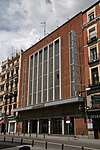Palace of the Marquis of Molins
Bien de Interés Cultural landmarks in MadridBuildings and structures in Cortes neighborhood, MadridPalace stubsPalaces in MadridSpanish building and structure stubs

The Palace of the Marquis of Molins (Spanish: Palacio del Marqués de Molins) is a nineteenth-century building in Madrid, Spain. Originally the property of Mariano Roca de Togores y Carrasco, 1st Marquis of Molíns, it now belongs to the state. It was adapted in the 1970s to serve as an annex to the Real Academia de la Historia. The building is protected by a heritage listing, having been declared Bien de Interés Cultural in 2004.
Excerpt from the Wikipedia article Palace of the Marquis of Molins (License: CC BY-SA 3.0, Authors, Images).Palace of the Marquis of Molins
Calle Amor de Dios, Madrid
Geographical coordinates (GPS) Address Nearby Places Show on map
Geographical coordinates (GPS)
| Latitude | Longitude |
|---|---|
| N 40.413359 ° | E -3.698289 ° |
Address
Calle Amor de Dios 2
28014 Madrid (Centro)
Community of Madrid, Spain
Open on Google Maps










